Postdoc Work-in-Progress Talk—Steven Brandwood
Postdoc Work-in-Progress Talk—Steven Brandwood
"Nikias' Delia and Revived Festival Performance”
613 Hamilton Hall 2:10-4p
Events in the Department of Classics at Columbia University and related Classics and ancient studies departments and organizations
Postdoc Work-in-Progress Talk—Steven Brandwood
"Nikias' Delia and Revived Festival Performance”
613 Hamilton Hall 2:10-4p
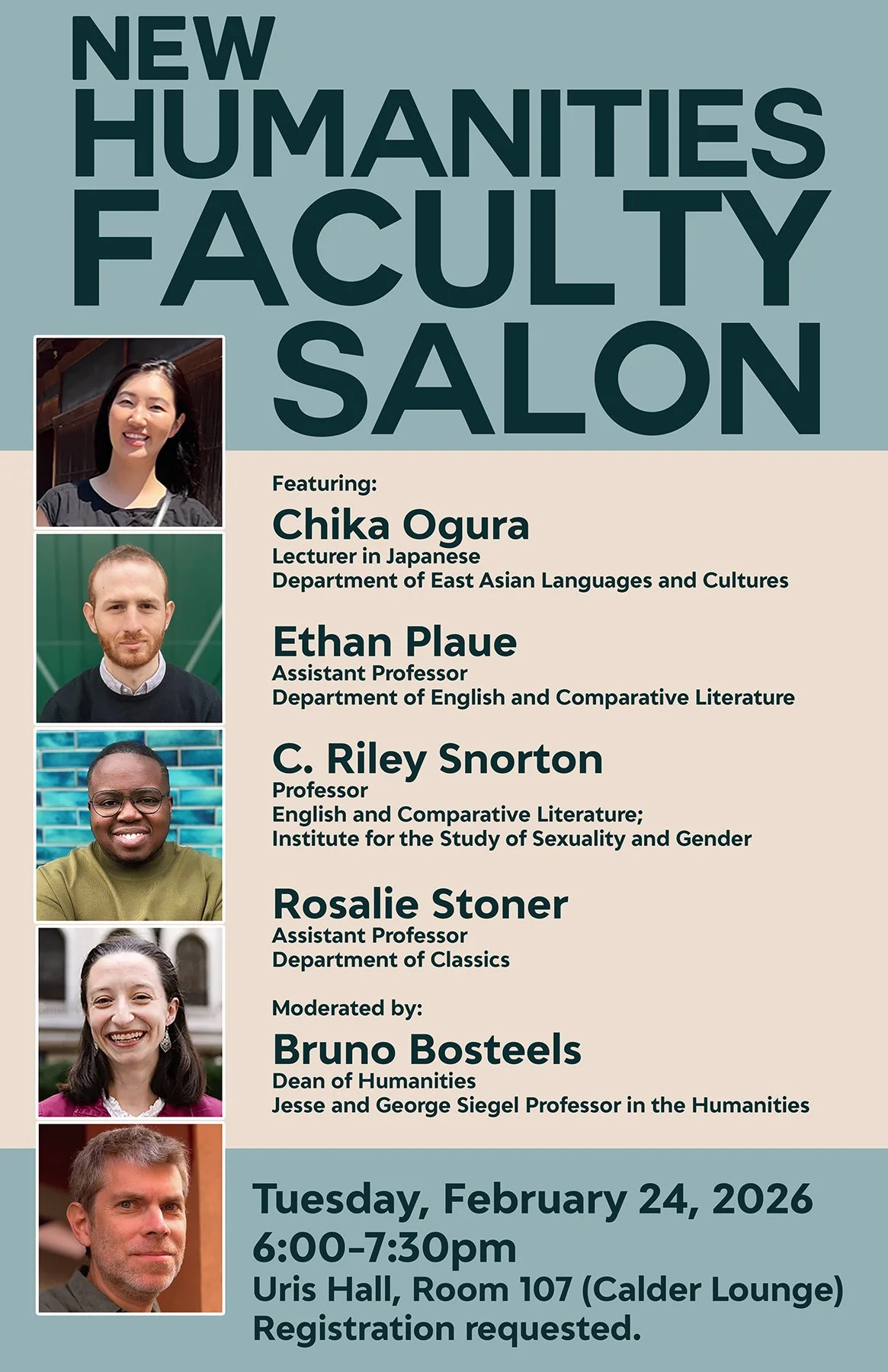
Tuesday, February 24
6:00-7:30pm
Uris Hall, Room 107 (Calder Lounge)
Please join Division of Humanities Dean Bruno Bosteels in welcoming our newest colleagues from across the division.
Hosted by the Division of Humanities in the Arts and Sciences, the New Humanities Faculty Salons are an opportunity to meet new faculty members as they join the Columbia Humanities community. Learn about their current work while you enjoy conversation, drinks, and snacks with faculty and graduate students. By bringing together scholars from across the Division, we hope to open conversations across the wider Humanities community.
This February, we welcome:
Chika Ogura, Lecturer in Japanese Department of East Asian Languages and Cultures
Ethan Plaue, Assistant Professor Department of English and Comparative Literature
C. Riley Snorton, Professor English and Comparative Literature; Institute for the Study of Sexuality and Gender
Rosalie Stoner, Assistant Professor Department of Classics
Moderated by:
Bruno Bosteels, Dean of Humanities; Jesse and George Siegel Professor in the Humanities
Faculty and graduate students from all divisions are welcome to attend. Wine and snacks will be served.
Registration is required. Register here to attend.
We warmly invite you to join us for a Classics Open House on Thursday, February 27th, from 11:30 AM to 1:00 PM in Hamilton 618. Whether you are a curious newcomer or a devoted lover of the ancient world and its reception, this is a wonderful opportunity to connect with fellow students who share your interest in Greek, Latin, Modern Greek, and the civilizations that shaped our present. Come meet the faculty, learn about undergraduate research funding opportunities, and explore our summer courses — from classes here on campus to immersive programs in Athens. We will also be sharing details about our Fall 2026 course offerings, so you can begin planning the road ahead. We hope to see you there.
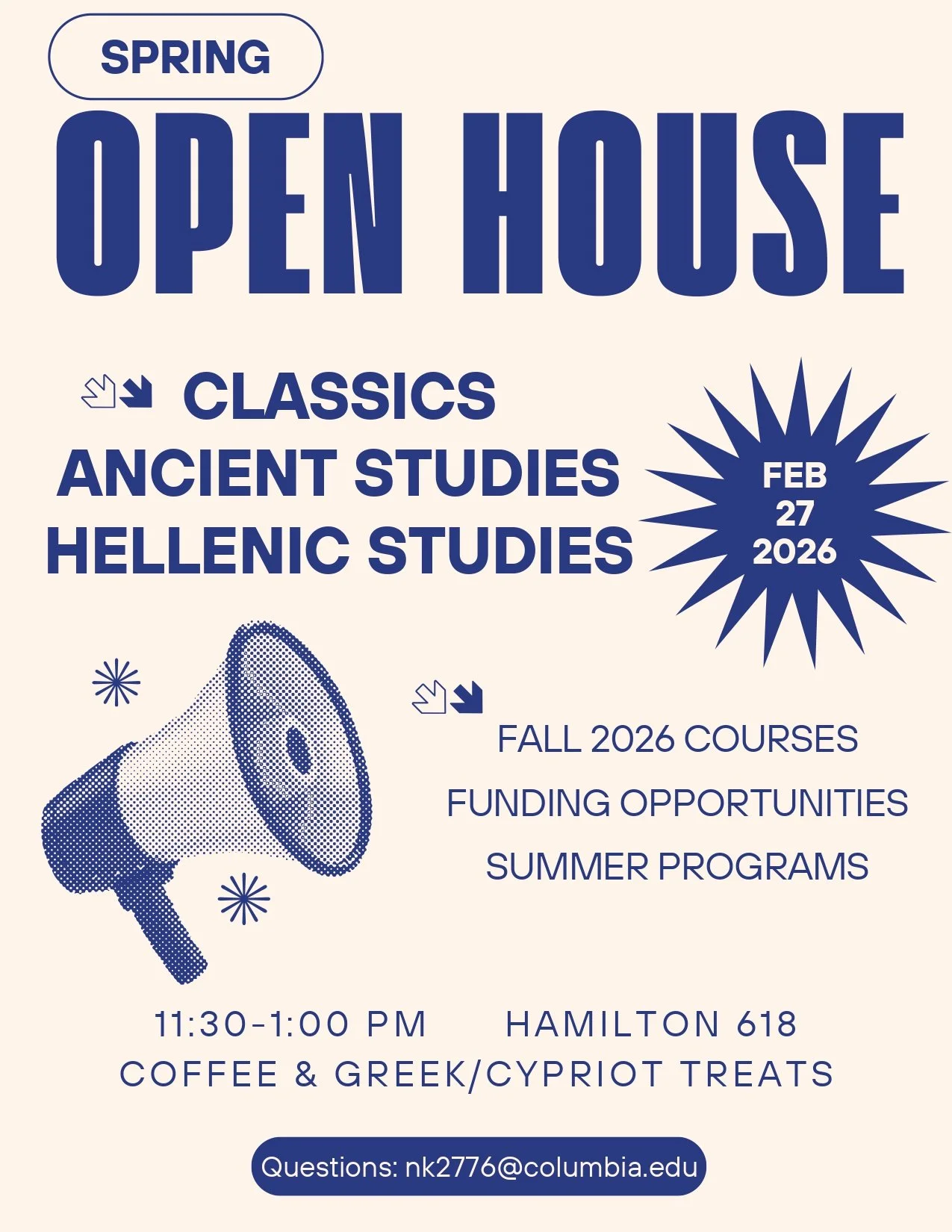
Ronald Knox, Classical Education, and World War I
Ronald Knox (1888–1957) was one of the most brilliant of a brilliant generation of English classicists. He was also a member of the English generation that was shattered by World War I. As his friends were fighting and dying in France, Knox himself took a leave of absence from his fellowship at an empty Oxford and spent 1915–1916 teaching Classics at Shrewsbury School. In my presentation, I’ll reconstruct Knox’s revolutionary teaching at Shrewsbury and the role that Classics played in giving his life meaning and purpose during the war years. Knox’s approach to the classroom and to Classics still has much to teach us: about Edwardian classical education and classical reception, about pedagogy, and maybe even about life.
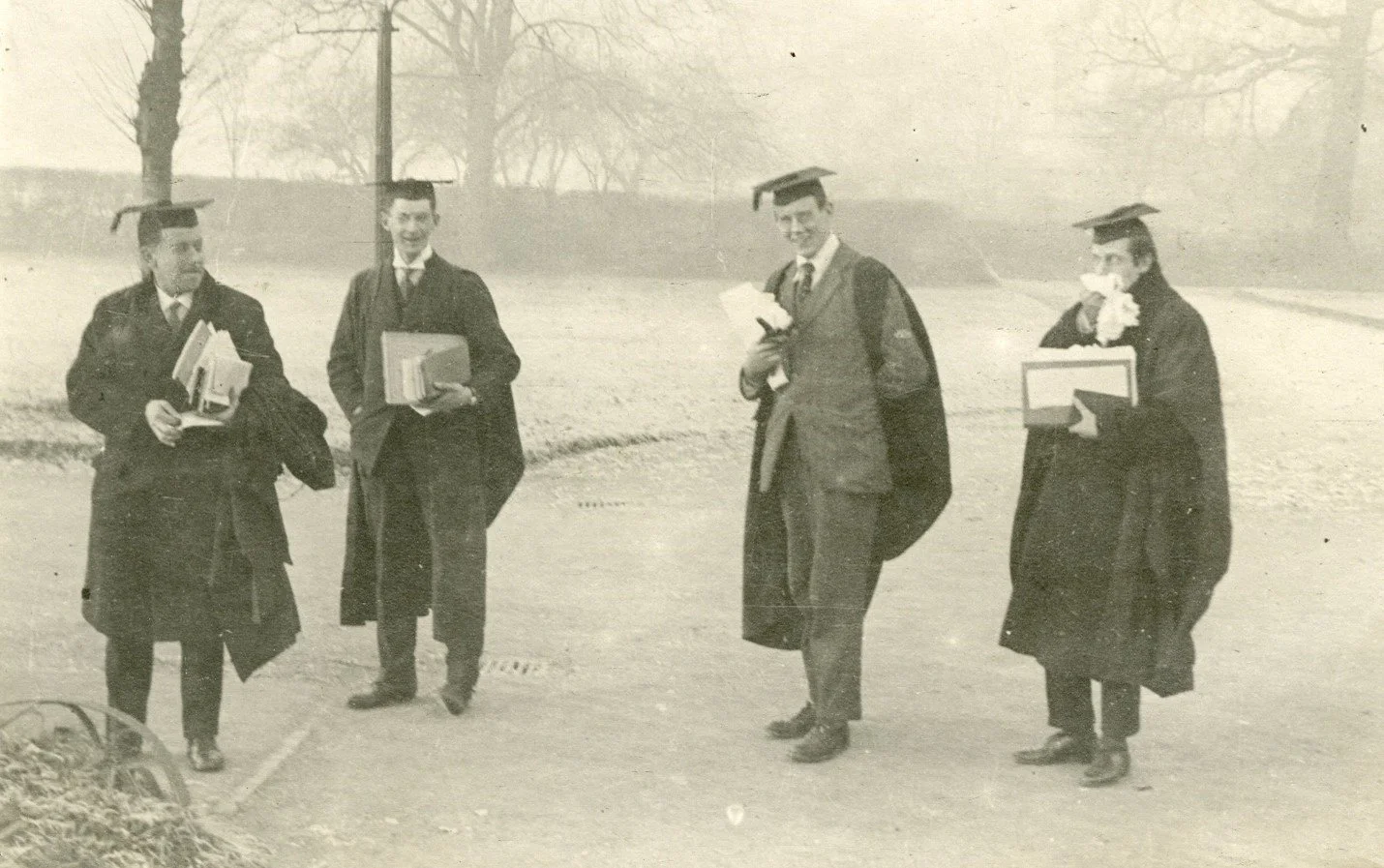
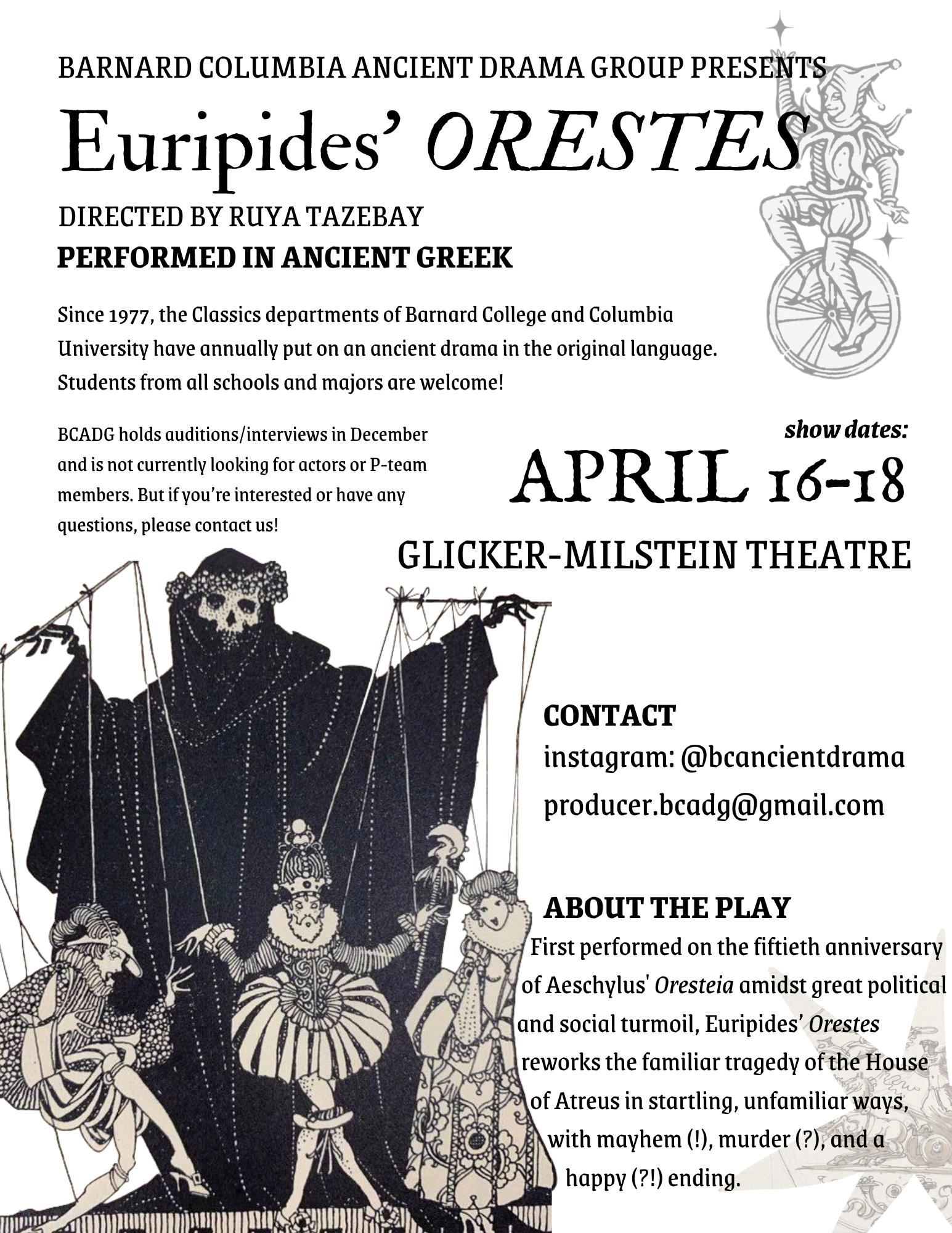
Session on Journal Publication with Professor Rosa Andújar
April 17th, 2026, 2:10pm in 613 Hamilton Hall
Can you rhapsodize like Homer or orate like Cicero? Come and compete against other Greek and Latin enthusiasts and win these prizes:
Prizes for the Oral Reading of Greek: 1st: $300; 2nd: $200; 3rd: $100.
Prizes for the Oral Reading of Latin: 1st: $300; 2nd: $200; 3rd: $100.
Any college or university student is eligible to compete. Contestants may compete for both the Greek and Latin prizes, or for either one. Memorization is not required; feel free to read from a script.
Choose one of the following passages:
Greek: Plato, Symposium 189d5 (δεῖ δε ...) to 190a4 (... ἐικάσειεν) OR Euripides, Medea 230-43
Latin: Sallust, Bellum Catilinae 52.2 (l onge alia ...) to12 (... perditum eant ) OR Horace, Odes 1.9
Registration Deadline is 18 April, 2026. Please email Prof. Katharina Volk to register.
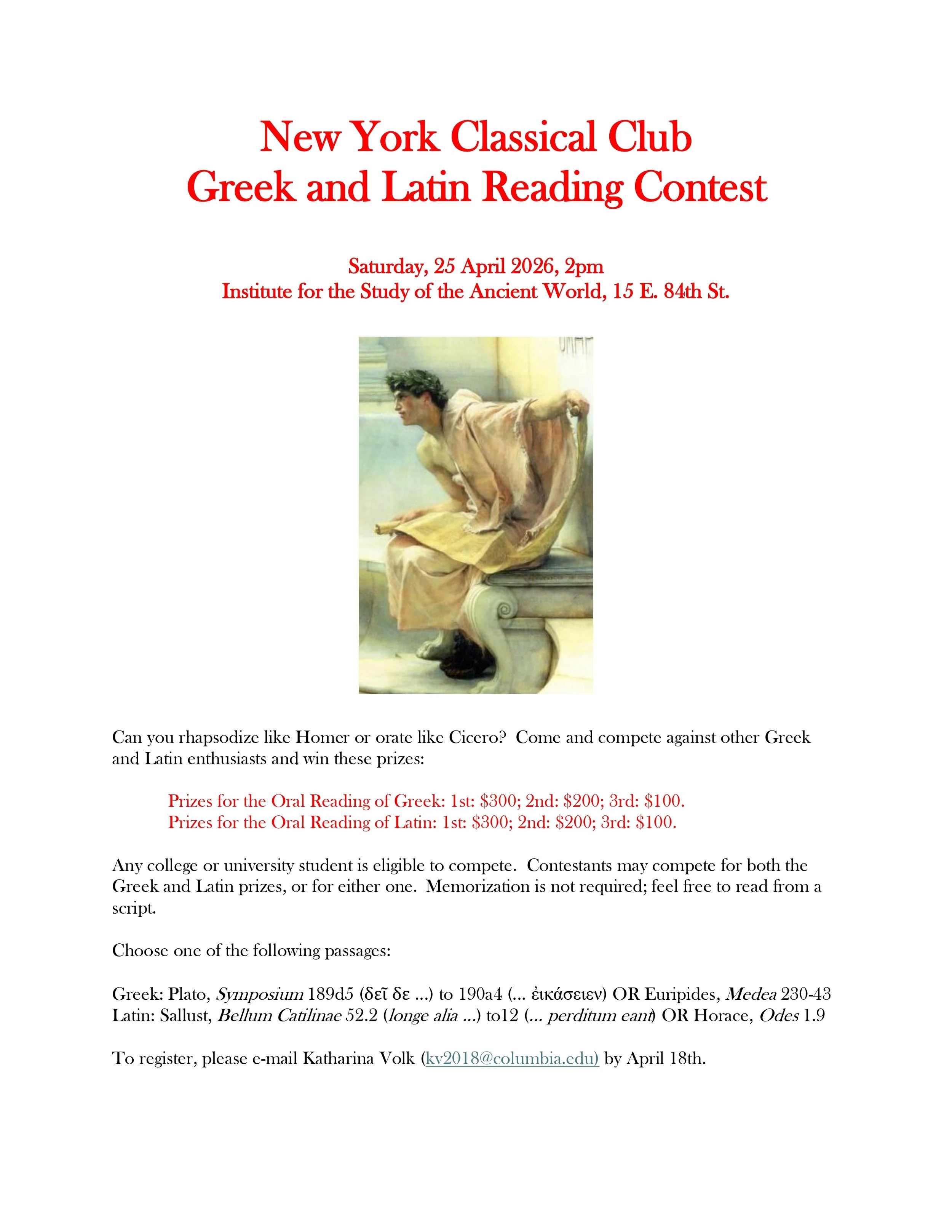
** Please Bring a dictionary and laptop **
For more information, please contact Shante Tucker, Administrative Assistant, at st3516@columbia.edu.
Jeremiah Coogan (Santa Clara University) will be giving a talk entitled "Textual Orthotics: Galen, Early Christians, and the Politics of Reading."
The talk will take place this Friday, February 13th, at 4:10 pm in Hamilton 516.
Please note: In order to enter the Columbia campus, you will need either a valid Columbia ID or a guest access QR code. To receive guest access, please email Melody Wauke (maw2277@columbia.edu) at least two days before the event.
We hope you will be able to join us!
Both before and after vernacular histories of the colonial Americas, the New World was widely read about in Latin. In this talk, I will present and examine the Historia naturalis Brasiliae (1648, “HNB”), a multi-volume Latin treatise on the flora, fauna, and indigenous societies of northeast Brazil, which was under Dutch control between 1630 and 1654. The result of a Dutch imperial network whose officials were invested in Latin learning, the HNB enjoyed wide circulation in northern Europe and beyond, and it was considered as an authoritative treatise until the 19th-century. The widespread assessment that the HNB is an early example of empirical rather than textual methods has influenced the practice of modern scholars, who often mine the text for ethnohistorical insights, sometimes in the hopes of “reconnecting” the information it presents with contemporary indigenous communities. But how and under what conditions was the information compiled in the first place? And why does this matter? I will show that the HNB is rooted in practices of Dutch Latinity, which the authors used as conduits for orienting, systematizing, and supplementing their direct experience of Brazil. The creators of the HNB inventively deployed Greco-Roman literature and taxonomies learned at Leiden University, including Hippocrates’ Airs, waters, places and Pliny’s Natural history, as instruments to communicate the significance of the treatise as well as to channel and delineate information. I will argue that these intellectual conditions undermine a neat picture of empiricism and recontextualize the information presented in the HNB, shedding light on the text as a uniquely Dutch configuration of scientific knowledge at crossroads between the classical tradition, experience, and empire. Attention to the HNB in its intellectual context not only has the potential to illustrate a fundamental episode of the afterlives of ancient authors and their colonial uses; it also offers new avenues to explore the early modern (mis)understanding of the New World, thereby highlighting the relevance of classical studies in the assessment of early modern sources of ethnohistorical information.
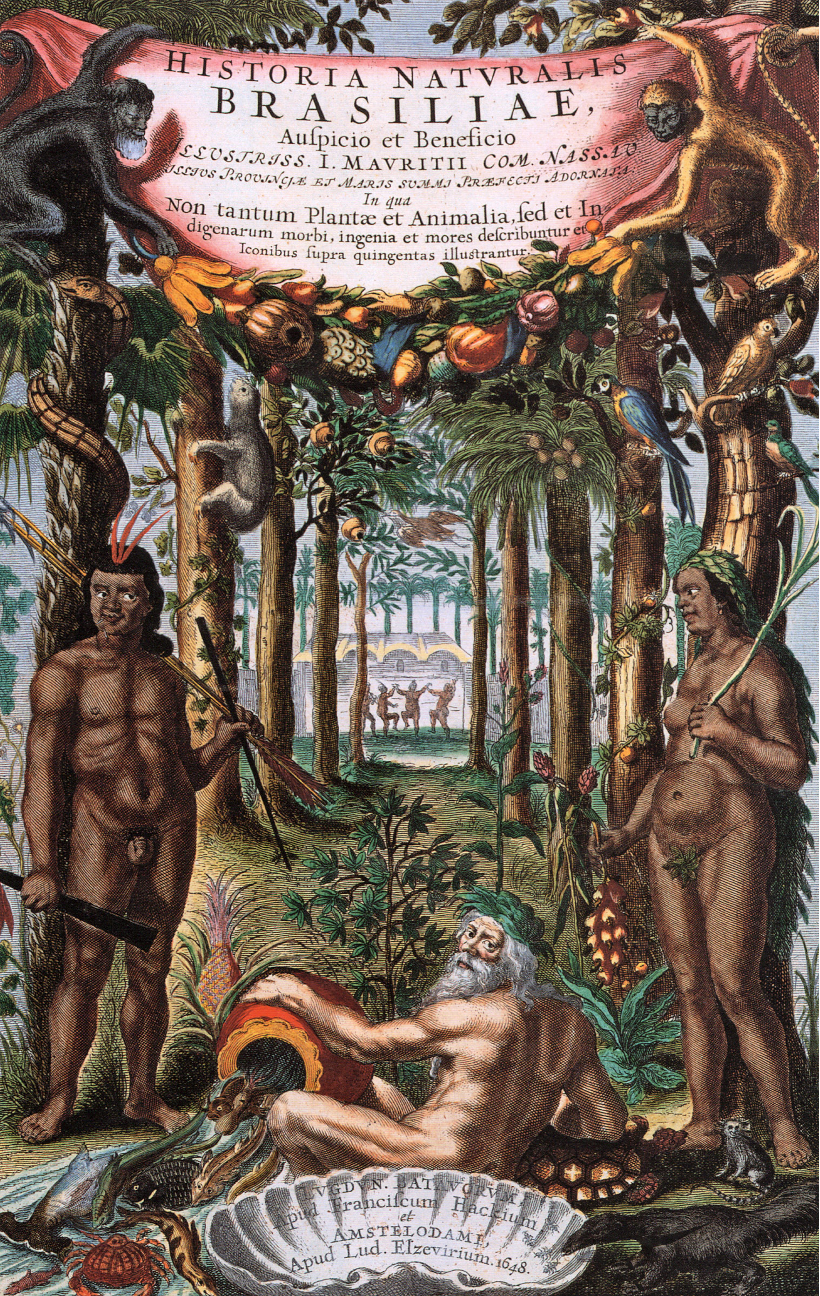
Postdoc Work-in-progress talk - Laurens Van der Wiel
613 Hamilton Hall 2:10-4 p.m.
Columbia University will host the Hodie et Cras Symposium on Saturday, January 31, 2026, for a full-day symposium that explores how the ancient world resonates with today. The Hodie et Cras Symposium connects high school students directly with Columbia Classicists through lectures, workshops, and discussions to make Classics accessible, relevant, and alive.

** Please Bring a dictionary and laptop **
For more information, please contact Shante Tucker, Administrative Assistant, at st3516@columbia.edu.
A New World of Latin: Renaissance Humanism and the Early Americas in Peter Martyr’s De orbe novo decades (1511-30)
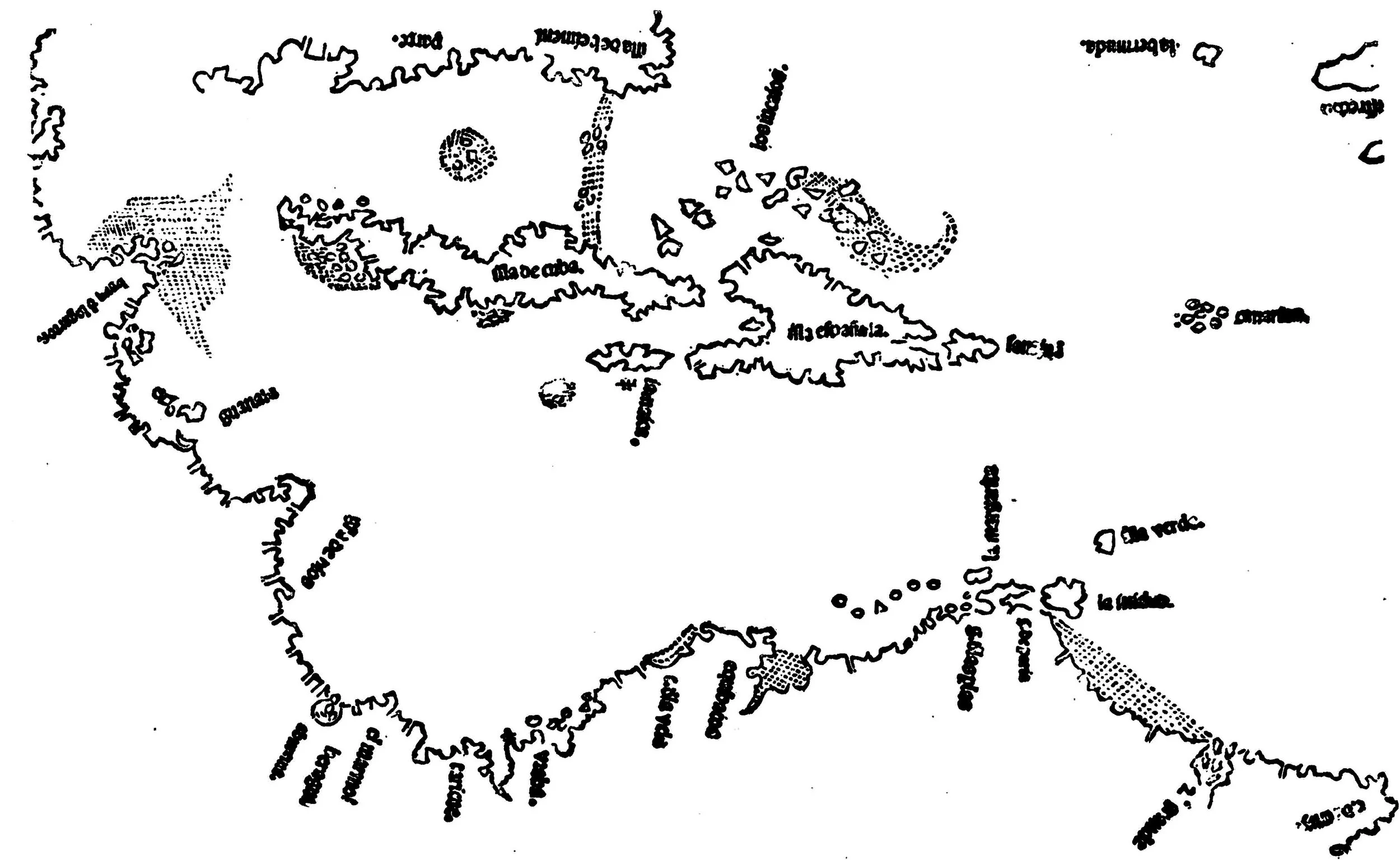
Before and after vernacular histories of the early Americas, the New World was widely read about in Latin. In this talk, I will present and examine Peter Martyr de Anghiera’s De orbe novo decades (1511-30), the first substantial European history of the New World. Written by an Italian humanist based in Spain, the Decades are an eight-book account that covers events between 1493 and 1524, including the conquest of modern-day Mexico, Cuba, Jamaica, and Guatemala. The Decades were published and republished broadly throughout the early modern period, significantly shaping Europeans’ perceptions of the New World. Despite its relevance, the work is rarely the object of sustained scholarly study, not least because scholars have found it difficult to ascertain Martyr’s methods. He has been seen as writing in a rushed, journalistic style in response to the ever-growing availability of information about the novelties of the Americas. The fact that he entitled his work as “Decades” has also led to the commonplace, yet unexamined, assessment that Martyr wrote following the model of Livy.
Moving away from these labels, I will argue that the Decades are a humanistic inquiry into American societies that was inspired by, and developed alongside, the humanistic investigation of Mediterranean antiquity and languages. Focusing on the first three Decades, which cover the exploration and conquest of the Caribbean and Central America, I will show that Martyr utilizes Latin both as a linguistic/philological model for approaching and describing indigenous languages and as a guide to making the societies of the Americas legible to his readers. The resulting account is not a surface description but instead an in-depth investigation of the Americas and its indigenous societies. The Decadesinaugurate a tradition of indigenous American philology based on Latin as well as reveal Martyr’s understanding of these indigenous societies’ own antiquity. Attention to Martyr’s work in its intellectual context, I contend, not only has the potential to illustrate a fundamental episode of the afterlives of ancient authors and their colonial uses; it also offers new avenues to explore the early modern understanding of the New World.
NOTE: To access the Columbia campus, you need to have a valid Columbia ID or a guest QR code. For guest access, please email kv2018@columbia no later than one day before the event.
** Please Bring a dictionary and laptop **
For more information, please contact Shante Tucker, Administrative Assistant, at st3516@columbia.edu.

The Barnard-Columbia Ancient Drama Group is excited to announce auditions for our 2026 production of Euripides’ Orestes, performed in the original Greek. In addition, we are also looking to recruit for our production team; if you are interested, please fill out the form linked below.
First performed on the fiftieth anniversary of Aeschylus' Oresteia amidst great political and social turmoil, Euripides’ Orestes reworks the familiar tragedy of the House of Atreus in startling, unfamiliar ways, with mayhem (!), murder (?), and a happy (?!) ending.
*Although the play will be performed in ancient Greek, auditions will be held in English. Those who are unfamiliar with Greek are encouraged to audition. Previous productions have featured actors with no prior knowledge of Greek, and we will provide assistance with pronunciation and memorization.*
*Auditions will be in Milbank Hall on:
Thursday, December 4th: 6-8 p.m.
Sunday, December 7th: 4-6 p.m.
Monday, December 8th: 6-8 p.m.
Tuesday, December 9th: 5-8 p.m.
or schedule a different time: email rt2798@columbia.edu
For more information on our production and audition materials, see our Audition Pack: https://docs.google.com/document/d/1lqd39h0IV6GbCDco7TRC49eFBC7TlkZwNCM7YnPxels/edit?usp=sharing
You can sign up for an audition here: https://docs.google.com/spreadsheets/d/1oYhyXZcobDGgsyZIp-jUyT8XwHmosFKCsMCvGWd25bI/edit?usp=sharing
You can indicate your interest in a production role here: https://forms.gle/bZztm6BwU5maXQbAA
If you have any questions, please email the director, Ruya Tazebay, at rt2798@columbia.edu
The Columbia Classics Lecture Series committee is excited to announce the following talk in our series:
Nathaniel Jones (Washington University in St. Louis) will give a talk entitled "Time, Space, and Experientiality on Roman Sarcophagi." Professor Jones has kindly agreed to pre-circulate an abstract, pasted below:
The body presents the principal problematic of the ancient Roman sarcophagus. A sarcophagus is sized to the body which it protects and encloses. It planarizes and stabilizes that body, hiding the inevitable metamorphosis of post-mortem decay behind an ordered and unchanging surface. Many Roman sarcophagi are also decorated with figural sculpture, meaning that their planar surfaces are themselves dissolved into compositions filled with represented bodies, some heroic, some tragic. In this way, the sarcophagus is also a site where the represented and real body come into contact, and in so doing creates a unique form of narrative experientiality. This paper seeks to examine how narrative experientiality functions on sarcophagi, in often surprising ways, to create a reciprocal relationship between viewer and deceased. It examines some well-known phenomena, including biographical and battle sarcophagi, and some lesser-known ones, such as the depiction of mile markers, across a wide range of sarcophagus types, and suggests that the evocation of experientiality may drive formal considerations as much as questions of narrative plot or the apposition of canonical Roman virtues.
The talk will take place on Friday, November 14th, at 4:10 pm in Hamilton 703.
Please note: In order to enter the Columbia campus, you will need either a valid CUID or a guest access QR code. To receive guest access, please email Jazmín Novoa Lara (jan2191@columbia.edu) at least two days before the event.
We hope you will be able to join us!
Join us for our upcoming Open House—a great opportunity to meet fellow students and faculty, connect with our community, and learn more about our exciting new majors and minors. Light brunch will be served, and you’re welcome to drop in for as long as you can—whether just a few minutes or the whole event, we’d love to see you there!
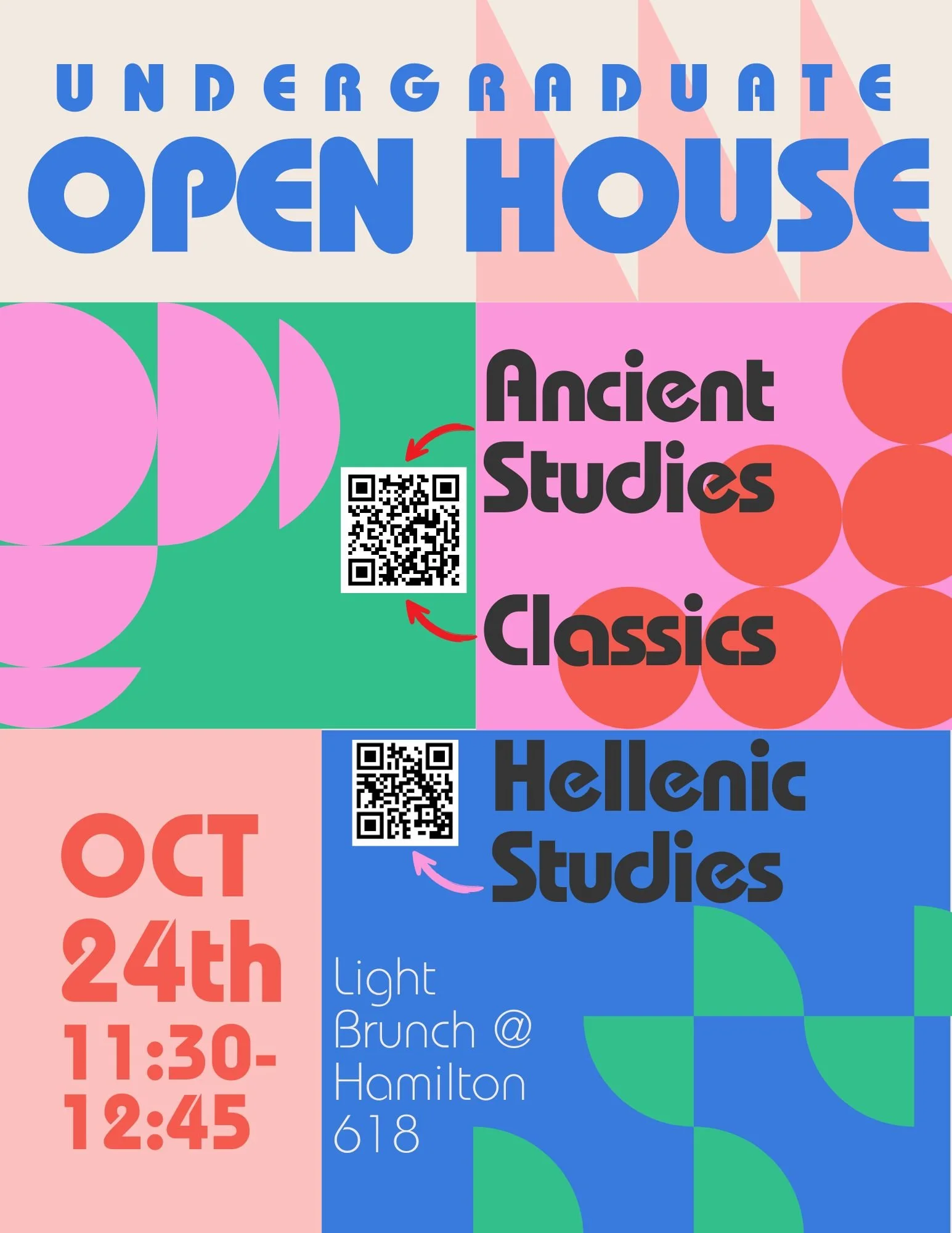
This is a reminder that Cat Lambert (Cornell University) will be giving a talk entitled:
"Scissoring Cavafy: Eve Kosofsky Sedgwick’s ‘artist’s book,’ The Last Days of Pompeii."
The talk will take place on Tuesday, October 21st at 4:10 pm in Hamilton 516.
Abstract:
Shortly before her death in 2009, Eve Kosofsky Sedgwick made a unique ‘artist’s book’ by altering a 1976-edition of Edward Bulwer-Lytton’s The Last Days of Pompeii (1834), a novel that framed Pompeii’s fiery destruction as God’s punishment for its inhabitants’ decadent “gaiety” of life. In this paper, I analyze one of the central alterations Sedgwick makes to the book: the collage of 22 excerpts from the poetry of C. P. Cavafy. I argue that Sedgwick performs across this book’s pages a specifically Cavafian poetics of desire and reading. Further, Sedgwick’s Cavafian intervention materializes various threads of her well-known work on reparative reading, challenging the novel’s queer eradicating impulses through a “sustained seeking of pleasure” (Sedgwick 2003: 137).
Please note: To enter the Columbia campus, you will need either a valid Columbia ID or a guest access QR code. To receive guest access, please email Melody Wauke (maw2277@columbia.edu) at least two days before the event).
We hope you can join us!
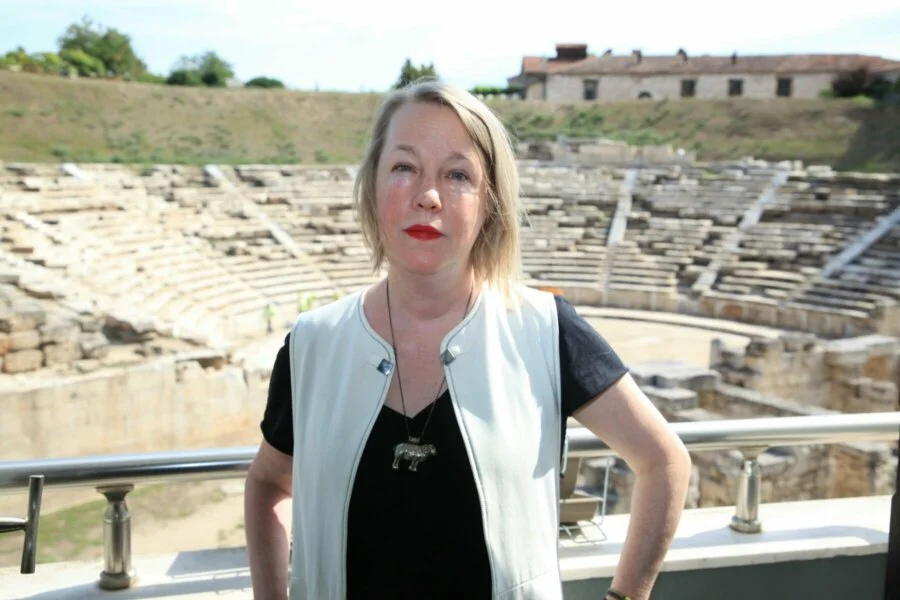
The Trojan Women
by Euripides, translated by Paul Roche
Directed by Tea Alagić
October 16-18, 2025
Thursday, October 16, 7pm — GET TICKETS! (ALUMNI NIGHT!)
Friday, October 17, 7pm — GET TICKETS!
Saturday, October 18, 2pm — GET TICKETS!
Saturday, October 18, 7pm — GET TICKETS!
Minor Latham Playhouse, Milbank Hall 118
theatre.barnard.edu/events/trojan-women
Tickets:
$14 general admission
$7 with BC/CUID
The Trojan Women – Director’s Statement
The core of The Trojan Women revolves around the devastating aftermath of war: the fall of Troy. As the women of Troy are captured by the Greeks, they grapple with loss, exile, and uncertain futures. Our production at Barnard will be set in a modern-day, juvenile detention or refugee center. We will draw a direct line between ancient suffering and the current refugee crisis, particularly among young people.
The women of Troy are not only losing their homes but their autonomy, identities, and futures. In modern refugee crises, young people often experience similar displacements—losing not only their homes but also their families, communities, and safety. A refugee camp or juvenile detention facility serves as a modern-day version of this liminal space where these young individuals have no control over their fate. The allegory is powerful: both the Trojans and modern refugees are victimized by forces far beyond their control (war, geopolitical conflict, systemic violence).
In The Trojan Women, the majority of the characters are women, and their grief is both individual and collective. This is echoed in the experiences of young women refugees or detainees, who often bear the brunt of sexual violence, loss of family, and trauma. This context will allow us to explore the gendered dimensions of grief, as well as the solidarity that can emerge among women facing similar fates. Contemporary refugee narratives often emphasize the resilience of women, and this theme can be drawn out in the chorus, where each member represents the grief of an individual while collectively embodying the suffering of all displaced people.
-- Tea Alagić, Director
Scenic Designer Fuqing Yue
Costume Designer Karen Boyer
Lighting Designer Betsy Chester
Composer & Sound Designer Robert M Johanson
Video Designer Yana Biryukova
Assistant Director Abigail Fixel
Stage Manager Rosie Peppe
Choreographer Sarah Kaplan
with Barnard and Columbia students: Bijan Atri, Emerson Antunes Black, Bess Blackburn, Zoë Chang, Jia Dixit, Anaitzel Franco, Bryan Jackson, Desislava Kremenlieva, Kiana Mottahedan, Isabel Tongson, Margaret Townsend, and Norah Vlas.

Our first speaker on September 9 will be Stephen Harrison and will talk on the following topic:
George Buchanan, Silvae 3: Desiderium Lutetiae
This paper presents an account of this poem by the Scot George Buchanan (1506-82), international scholar and teacher, tutor to Mary Queen of Scots and her son James VI, a leader of the Calvinist Scottish Reformation, royal minister, and perhaps the greatest Latin poet born in the British Isles. Silvae 3 (part of a book broadly based on Statius’ homonymous collection) is a work in which Buchanan represents through pastoral allegory his longing to return to Paris, the city where he had spent half his life, and which was written during his detention in Lisbon by the Inquisition (1551-2) on the grounds of unorthodox belief. The paper suggests that Silvae 3 is an intensely composed and highly allusive musical poem, which shows an interesting mixture of classical generic models (e.g., pastoral and elegy) as well as neo-Latin intertexts.
You will need a Columbia ID or a guest access QR to enter the Columbia campus. If you require guest access, please email Paraskevi Martzavou [pm2839@columbia.edu] at least 48 hours before the lecture.
** Please Bring a dictionary and laptop **
For more information, please contact Shante Tucker, Administrative Assistant, at st3516@columbia.edu.
Ancient Greek & Latin Placement Exam, August 27, 2025, 11:30 a.m.–1:30 p.m. in 616 Hamilton Hall
This is a sight exam; no dictionaries or grammatical aids may be used.
The exam is open to CC, GS, and Barnard students, and no prior registration is needed.
Please contact Professor Kakkoufa with any questions at nikolas.kakkoufa@columbia.edu, and Barnard students should contact Professor Ellen Morris at emorris@barnard.edu
Placement tests are offered each year (in late August) to assist Columbia students (CC, GS, SEAS) who enter with prior knowledge of Greek or Latin in finding an appropriate course.

Hello everyone,
We are excited to invite you to the fourth and last talk of the Spring 2025 Semester!
Jake Haagenson (Columbia University) will give his talk entitled:
Socratic Ignorance in the First Alcibiades
and Implications for Authenticity
The talk will occur on Friday, May 9th, at 4:10 p.m. EDT in Hamilton 603, in person and on Zoom. A reception will follow.
If you would like to receive a Zoom link, please email Holly Axford (ha2694@columbia.edu). The Zoom link will be circulated the day before the talk.
Socratic Ignorance in the First Alcibiades
and Implications for Authenticity
Abstract:
There is academic controversy over whether the First Alcibiades is a genuine work of Plato. Yuji Kurihara (2012) argues that one piece of evidence against authenticity is that, in the dialogue in question, Socrates expresses so-called “Socratic ignorance” as knowing (eidenai) that one does not know; whereas in works less doubtfully by Plato, such as the Apology, Socrates only avows that he thinks (oiesthai) he does not know. I agree with Kurihara that this is a difference that deserves readers’ attention. However, I offer that there are substantive reasons for Socrates’ use of eidenai to describe the cognitive attitude of one who is aware of her own ignorance. In order to make better sense of Socrates suggestive use of eidenai, I propose to turn from what commentators widely agree is a central concern of the First Alcibiades, self-knowledge, to the related conceptions of first-order knowledge that the dialogue evokes and, perhaps, explores. I argue that the First Alcibiades develops two criteria, one formal and the other substantive, for the sort of first-order knowledge that is the target of Socratic inquiry, especially in Platonic dialogues that ask so-called “ti esti” questions. I propose that the formal criterion holds that someone who knows (x) will not contradict herself concerning (x) and that the substantive criterion requires that someone who knows (x) will have an expert conception of (x). Based on these criteria, which allow one to diagnose knowledge or ignorance, Socrates is positioned to describe Socratic ignorance as knowing that one does not know. In that case, Socrates’ distinctive use of eidenai is motivated by the substance of the dialogue and denotes a philosophical innovation. I suggest, then, that if Socrates use of eidenai lends any indication concerning authenticity, the philosophical innovation backgrounding this use is of the sort very much at home in Plato’s corpus.
** Please Bring a dictionary and laptop **
For more information, please contact Shante Tucker, Administrative Assistant, at st3516@columbia.edu.
We invite you to attend and participate in a small gathering within the Classics Department that will focus on the character and importance of the Second Century BCE in work being done by department members. Discussion will include considerations of the possible distinctiveness of a "late Hellenistic" period, overlaps and divergences between Greek and Roman cultural fields during the second century, and many others. Especially at this late point of notice, this will be an informal event; participants will present works-in-progress of their ongoing research into all matters second-century. All are welcome and encouraged to present their ongoing work, in whatever stage of completion. We hope that you will join us!
The event will take place on Friday, May 9th from 11a-1p in Hamilton 618 and we hope to see you there.



The New Euripides Papyrus (P. Phil.. Nec. 23 v ):
Fresh Perspectives on Tragic Rhetoric
Abstract:
In November 2022, a team of archaeologists from the Egyptian mission at the necropolis of Philadelphia in Egypt unearthed from a tomb a papyrus that contained 97 (to a considerable extent otherwise unattested) lines of Euripides’ fragmentarily preserved tragedies Ino and Polyidos. The papyrus was edited (in ZPE 230 [2024] 1-40) by Prof. John Gibert and Assistant Prof. Yvona Trnka Amrhein (University of Colorado Boulder), who launched a project towards interpreting this amazing new finding.
The present lecture, which derives from this project, will seek to explore the
debate (agon) in Euripides’ Polyidos preserved in 60 lines of this new papyrus text. It will investigate the structure of this debate, which takes place between King Minos and the seer Polyidos, representing political and intellectual authority, respectively; the agon’s rhetorical sophistication and underlying ideology; and raise questions about the impact of sophia (wisdom) on late fifth-century Athenian thought.
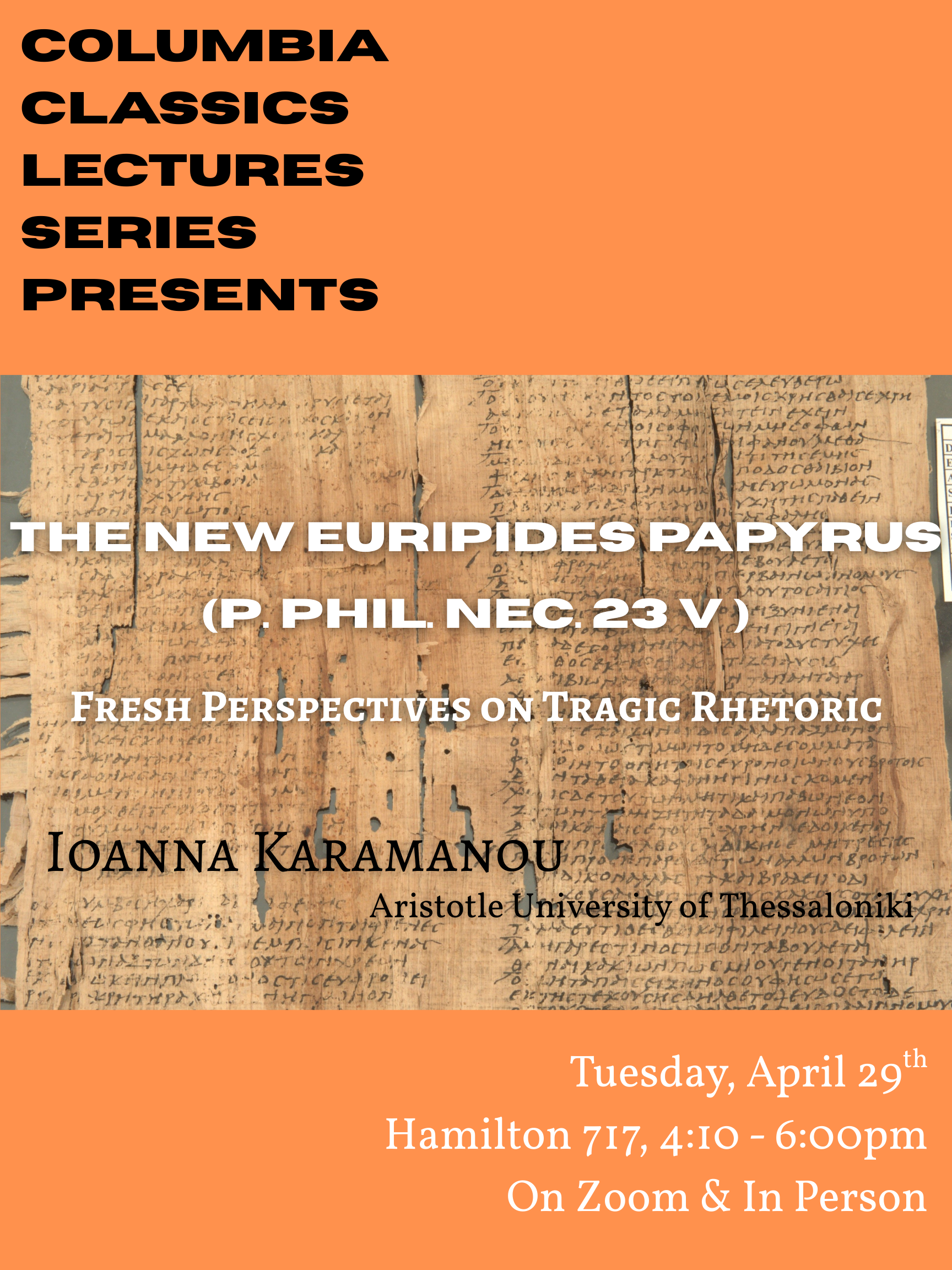
Hello everyone,
We are excited to invite you to the second talk of the Spring 2025 semester!
Thomas Biggs (University of St Andrews) will give his talk entitled
One is the Loneliest Number: Gnaeus Naevius and Livius Andronicus
The talk will occur on Tuesday, April 8th, at 4:10 p.m. EDT in Hamilton 702, in person and on Zoom. The reception will follow.
If you would like to receive a Zoom link, please email Holly Axford (ha2694@columbia.edu). The Zoom link will be circulated the day before the talk.
One is the Loneliest Number
Gnaeus Naevius and Livius Andronicus
Abstract:
This lecture explores intertextuality at the beginnings of Latin literature. Its broader interests are in simultaneity and sequence: the circulation of literary works without clear priority relations, the scholarly desire to order texts, and the ways in which style, trends, and vibe relate to temporal and often spatial coexistence. Following the conventional chronology, it is Naevius who reacted against and availed himself of Livius Andronicus’ development of a poetics in Latin inflected by Greek epic and dramatic forms. There are, however, alternative ways of conceptualising the interaction between these poets, which include notions of authorship that privilege the collaborative, collective, and distributed. The Middle Republic was a fluid period of mobility, contact, and convergence. Andronicus’ dates were even contested in antiquity, and the details of all authorial biographies from the era are unreliable on such matters. If compositional timelines are more entangled than is typically allowed in histories of Roman literature, opening the modes of interpretation can only offer greater understanding of the ways these texts generate meaning. Accordingly, the second half of this paper untethers the fragments from chronology and embraces the fact that they were composed and first received within the same moment. The paper concludes with the productive power of indeterminacy. It suggests that scholars of early Latin poetics should adopt concepts like interaction and interdiscursivity alongside more entrenched notions of literary reference and allusion that depend on sequence.